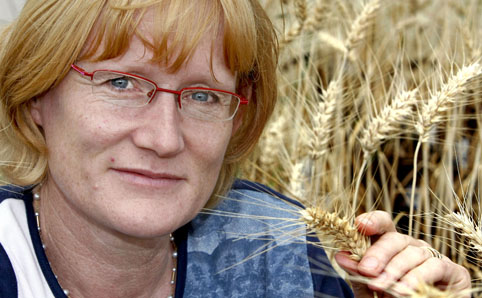Latest News Archive
Please select Category, Year, and then Month to display items
17 September 2018
Photo Charl Devenish
 Innocensia Mangoato’s research on using cannabis to reverse anticancer drug resistance has been awarded in the prestigious Women in Science Awards.
Innocensia Mangoato’s research on using cannabis to reverse anticancer drug resistance has been awarded in the prestigious Women in Science Awards.
“There’s this misconception among young people that science is difficult and that it’s somehow a man’s domain,” says Innocensia Mangoato, Masters student in Pharmacology, who has just been awarded in the prestigious Women in Science Awards by the Department of Science and Technology.
Cannabis research
Innocensia won in the Master’s Degree category for her research on the use of cannabis in reversing anticancer drug resistance. Her department had to apply for a special permit to grow cannabis for research and medicinal purposes.
“Her findings have already indicated a promising reversal of resistance to drugs in a variety of cancers. We plan to explore these results further in a possible PhD,” says her study leader, Prof Motlalepula Matsabisa.
Innocensia says she’s always had an interest in science, and initially wanted to study medicine. She ended up doing a BSc in Physiology and Genetics.
She hopes that her research will help government to develop a policy around the use of cannabis for medicinal purposes which could ultimately lead to developing cancer treatment with fewer side-effects.
Female mentors
“My mentor during my Honours studies was Dr Makhotso Lekhoa. Her passion for her field and her patience in conveying it to others really inspired me. We have some very powerful women in our Pharmacology Department,” says Innocensia.
Passion for science
“You know you’re passionate about your work when you find yourself going to the lab on Sunday afternoons!” she says. “I’m happy that I can be contributing to the knowledge production on this campus. And maybe one day I can be a mentor to other girls with that same passion for science.”
African Union acknowledges one of our own
2012-01-23
 |
|
Prof. Maryke Labuschagne
Photo: Hannes Pieterse
|
The African Union awarded an international award to Maryke Labuschagne, a professor in Plant Breeding at our Faculty of Natural and Agricultural Sciences, for her contribution to science in Africa.
Prof. Labuschagne received the African Union Kwame Nkrumah Scientific award in the category Life Sciences – Continental level. This is the highest level of this prestigious award programme.
The African Union Commission is committed to ensure that science and technology contributes to sustainable development efforts. In 2008 the African Union Commission launched the prestigious African Union Scientific Award Programme. This programme was later renamed the African Union Kwame Nkrumah Scientific awards.
The programme is implemented at National level for young researchers, Regional level for women scientists and is open to all scientists on Continental level.
The Continental level is the highest level of the programme. The objective is to give out scientific awards to top African scientists for their scientific achievements, valuable discoveries and findings.
Prof. Labuschagne has been part of our university for the past 23 years. Over the last 20 years she has been involved in training and educating scientists in plant breeding all over Africa. Her work also entails the development of better cultivars to ensure food sustainability on the continent.
“I really did not expect to win this award. The criteria were really strict and one always sells yourself and your achievements short,” says Prof. Labuschagne.
With this award, Prof. Labuschagne also receives US $100 000 (about R 804 180) in prize money, which will be used to renovate her department’s lab facilities and provide bursaries.
The official award ceremony will be held on Saturday 28 January 2012 at the United Nations Conference Centre in Addis Ababa, Ethiopia.